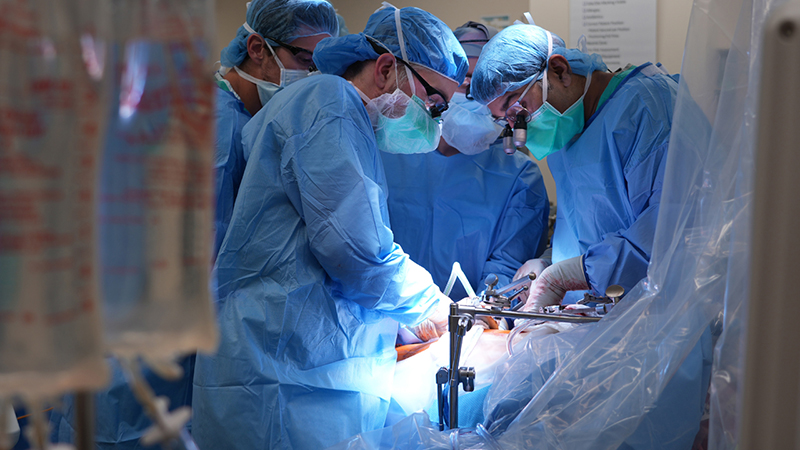Setting a New Standard for Cardiovascular Care
Published November 2020
Artificial Intelligence Aids Diagnosis
Cardiovascular disease remains the leading cause of death in the U.S., and early detection greatly impacts the survival rate. In addition, pre-existing conditions, including cardiovascular disease, place people at an elevated risk for severe illness from COVID-19, so quick and accurate diagnosis for cardiovascular disease is more important than ever.
In collaboration with Caption Health, Northwestern Memorial Hospital now offers patients expanded access to diagnosis and treatment through implementation of an ultrasound system guided by artificial intelligence (AI). With this new Caption AI system, patients can benefit from better cardiac assessments at the point of care.
“Our ultimate goal is to improve cardiovascular health wherever we need to, and Caption AI is increasing access throughout the hospital to quality diagnostic images,” says Patrick McCarthy, MD, chief of Cardiac Surgery and executive director of Northwestern Medicine Bluhm Cardiovascular Institute, which was involved in the early development of the technology.
Our ultimate goal is to improve cardiovascular health wherever we need to.— Patrick McCarthy, MD
A Complex Skill Simplified With AI
Performing an ultrasound exam typically requires years of training. However, Caption AI makes it easier for clinicians to perform timely and precise diagnostic-quality ultrasound exams, regardless of their expertise or past experience with ultrasounds. With this FDA-cleared AI-guided system, nearly any clinician and medical fellow can interpret quality ultrasound images of the human heart, increasing access to diagnosis and treatment of cardiovascular disease.
Caption AI essentially mimics the work of a highly trained diagnostic medical sonographer, providing expert turn-by-turn guidance, automated quality assessment and intelligent interpretation. The system:
- Guides the clinician to best position the ultrasound wand on the patient’s body
- Automatically records images for easier diagnosis
- Calculates ejection fraction, or the percentage of blood leaving the heart when it contracts, which is the most widely used measurement of heart function
Real-Time Results, Revolutionary Cardiovascular Care
As the first health system in the country to purchase the FDA-approved AI ultrasound devices, Northwestern Memorial Hospital is currently utilizing Caption AI within multiple clinical settings of the hospital, including the Emergency Department, Medical Intensive Care Unit, Cardio-oncology Clinic and Hospital Medicine group.
With this revolutionary AI system, more patients can access and reap the benefits of a point-of-care ultrasound (POCUS). These benefits include:
- More timely and accurate diagnoses
- More accurate monitoring
- Reduction in number of visits for additional imaging
- Real-time results that can be recorded into a patient’s electronic medical record
With real-time results, the AI system fuels more integrated care. "I think the most exciting part is that Caption AI allows our Intensive Care Unit (ICU) providers to do a point-of-care, real-time ultrasound for a patient who is sick,” says James M. Walter, MD, associate program director for the Pulmonary and Critical Care Medicine fellowship at Northwestern Medicine, who first used the technology on patients at Northwestern Memorial HealthCare. “It’s a way to integrate two worlds — real-time point-of-care ultrasounds and urgent care in the ICU — with details that are ready for cardiologists when they need them.”
Backed by Research
To expand access to safe, effective and accurate diagnosis and treatment, Bluhm Cardiovascular Institute spearheaded clinical trials in 2018 to investigate the role of AI and machine learning in the realm of cardiovascular disease. Results of such trials showed the effectiveness of this life-saving tool and supported the monumental FDA authorization of the Caption AI system in 2020.
If you are at risk for cardiovascular disease, talk to your physician about diagnosis and treatment options.





